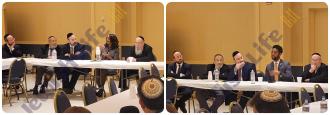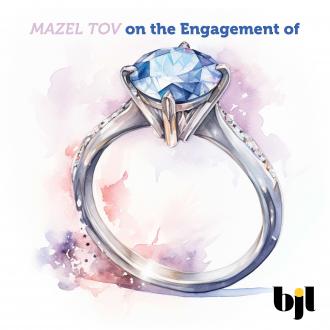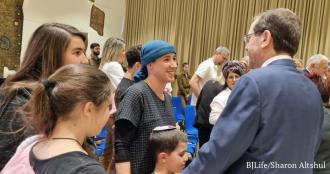The ‘bookends’ of this week’s portion, Acharei Mos, couldn’t be more diametrically opposed.
We begin with a detailed description of the Yom Kippur Service pinnacled with the High Priest entering the Holy of Holies, where even angels may never enter, offering the special incense in total privacy with G-d, on this extraordinary once a year opportunity.
At the other end of our portion the Torah enumerates the detailed laws governing the full gamut of forbidden intimate relationships, an area of life and compulsion we share with the animal kingdom.
On the simplest level this dichotomy accentuates the realities that although man can be elevated to levels of spirituality that transcend even those of angels, and may even traverse territory forbidden to angels, we are nevertheless equally susceptible in sinking to depravity on the strata of the lowliest beast.
In fact, it is precisely on this holiest day of the year, even as the day wanes after having been totally absorbed and focused on our relationship with the Almighty, that the Torah portion we read during the late afternoon Mincha service on Yom Kippur is precisely this portion of forbidden intimate relationships, lest we ever forget our vulnerability to succumb to these strong animalistic urges.
But there seems to be more to it than this simple but important realization.
Rabbi Yishmael asserts that the service of the he-goat that was selected in a special casting of lots as the one to be flung off a cliff, serves to atone specifically for transgressions related to forbidden intimate relationships.
The terrain this goat is cast off to is called עזאזל, Azazel. This, Rabbi Yishmael asserts, alludes to two angels, עוזא, Uza, and עזאל, Azael, with the one word עזאזל a combination of both names.
These two angels of destruction denounced Adam for his failure in yielding to his evil inclination and partaking from the Tree of Knowledge. They further alleged that they would have been able to resist temptation had they been given the chance. G-d acquiesced to their challenge investing them with an evil inclination and dispatched these נפילים, ‘fallen angels’ towards earth to see how they would fare. (יומא סז: ורש"י שם ד"ה עוזא ועזאל)
The Torah reports the results of their test:
ויראו בני האלקים את בנות האדם כי טבת הנה ויקחו להם נשים מכל אשר בחרו (בראשית ו ב), The sons of G-d saw that the daughters were good, and they took themselves wives from whomever they chose.
Abusing their powers, they too fell prey to the mighty evil inclination, breaching the laws of morality and becoming an object lesson to the power of temptation.
The nature of this sin specifically would then seem to be central to the Service of Yom Kippur. What is the lesson the Torah seeks to convey?
The term the Torah uses in describing this violation גילוי עריות, is often literally translated as ‘uncovering nakedness’. Yet Rashi in defining the term ערוה, as it appears in the verse where Yosef accuses his brothers of being spies seeking to uncover עֶרוַת הארץ (בראשית מב ט), literally, the land’s nakedness, explains it more accurately to mean its ‘vulnerability’; the weak point from whence the land can be conquered.
Perhaps this is the deeper understanding of the pernicious nature of this sin as well.
G-d created man to connect with one another. There are familial relationships that connect us inherently, parent to child, sister and brother, uncle and aunt, daughter in law and son in law.
G-d also created a magnetic attraction between man and woman that draws them one to another. The purpose of that inclination is to be utilized in discovering our soul-mate, our missing ‘half’, and in its full intimate expression, as a physical celebration of the profound spiritual intimacy that exists between two destined souls.
The Torah delineates the various ‘close’ relationships that naturally exist, instructing us that the physical pull that one might think is there to enhance that closeness is taboo and misplaced in these relationships.
But even when one finally identifies one’s ‘partner’ in life, there too, one must be careful not to define the connection by this physical draw alone, but rather to use it as an enhancer of the connection that exists on a much more profound and meaningful level.
When one’s charm, position of power and stature, or physical allure is what draws another towards intimacy, rather than the genuine appreciation of character, common values, noble goals and aspirations, one is exploiting the vulnerability of the intended ‘target’ in simply getting one’s want.
Isn’t that what transpired with these ‘fallen angels’? No doubt their other worldly qualities and attributes allowed them to impose their ‘might’ in capturing the women they ‘chose’, exploiting these vulnerable women into succumbing to their magnetic appeal, allowing themselves to be manipulated.
So גילוי עריות, might more accurately translate as the ‘exploitation of an other’s vulnerability’ for one’s own personal gain.
I have always sensed that the laws of harchakos that were enacted by our Sages during the time of a woman’s impurity, when a couple must implement different devices of separation, weren’t merely to keep the ‘evil inclination’ at bay. It is more so a time when we remove all physical attraction from the equation of marriage and focus on the ‘real’ other opposite us. Whether not touching one another; refraining from passing objects directly; not exposing parts of the body; abstaining from frivolous talk, and the many other safeguards we apply, they are all strategies that enable us to face each other solely with our very essence and core value, without the interference of illusory allure that so often clouds our ability to perceive each other honestly and accurately.
The key to succeed in achieving this goal lies in our ability to identify and appreciate our own inner qualities, as well as to discover and value the greatness of character in our spouses.
The vacuum that develops from feelings of personal worthlessness or from a diminished capacity or willingness to appreciate true character in a spouse is often filled with the unauthentic ‘filler’ of raw intimacy that creates an illusion of fleeting ‘worth’ and contrived ‘bonding’.
The Holy Izhbitzer quoting the Zohar informs us that it is was these two angels, Uza and Azael, who cast doubt before G-d on the creation of man blurting out, מה אנוש כי תזכרנו (תהלים ח ה), What is man that You should remember him... (בית יעקב עיוה"כ)
It is this dangerous attitude of feeling unworthy that these prosecuting angels instilled within man that drives us towards sin and this one in particular. It is to negate this influence of Azazel that we dispatch the he-goat in seeking to bring man back to an awareness of each man’s personal value in G-d’s eyes.
Perhaps it is the beginning of our portion that inspires and empowers its conclusion. The very notion that man can elevate oneself to levels that surpass those of the mighty angels, for only man not angel may enter the Holy of Holies and encounter G-d alone, is testament to the unparalleled stature of man in G-d’s eyes.
It is that knowledge of our supreme worthiness that enables us to relate to and appreciate ourselves and our spouses in the most healthy and genuine way. Once we understand and appreciate this fully we will be equipped with the strength to ward off the temptation to ‘exploit each other’s vulnerability’, steering clear from the pitfalls of these forbidden intimate relationships.
באהבה,
צבי טייכמאן
















